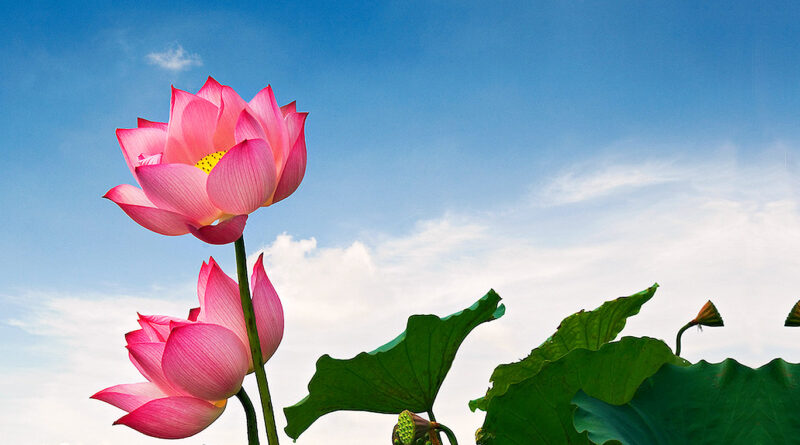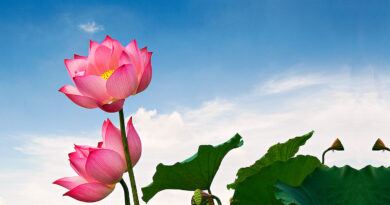ENERGY & EFFICIENCY
Energy & Efficiency
There is a famous story of the young man who was very delicately brought up—so delicately brought up that he even had hair on the soles of his feet. When he ordained as a monk, he tried practicing meditation really hard, sitting long periods of time, doing walking meditation long periods of time. But because his feet were so tender, all that walking got his feet bloody. He thought to himself, “Here I’ve given all the effort I can, and nothing is coming of it.” He thought of disrobing. The Buddha sensed this and appeared right in front of him, and asked him, “Back when you were a layperson, did you play the lute?” The monk said he had. He was skilled at playing the lute. And the Buddha asked him, “When you tightened the strings too tight, what happened?” It didn’t sound right at all. “How about too loose?” Didn’t sound right either. And the Buddha then said, “In the same way, you should tune your energy to the point where it’s just right and then tune the rest of the strings of your practice.” In other words, conviction, mindfulness, concentration, discernment: Tune those to the level of your energy. In that way the practice will come out right.
So keep this in mind as you’re meditating. Look at the level of energy you have—this can be both physical and mental energy—and tune your practice to that level. Everything else has to be tuned to that. In other words when you’re sick, when you’re not feeling well, the practice goes one way. You may spend less time putting physical energy into the practice, and you may not be able to gain the levels of concentration or very precise mindfulness that you want, but do the best you can given the circumstances. When your energy level is high, don’t be too quick to say, “Well, I’ve meditated enough today. It’s eleven o’clock, that’s my usual time to go to bed, I’ll go to bed then.” When your energy level is high, stick with it. Tune your practice to the level of energy that you have. And do what you can to increase the energy. This is one of the roles of right mindfulness: gaining a sense where you’re doing the practice inefficiently. It’s like increasing the gas mileage on your car. You may have a limited amount of gas, but if the car is more efficient you can go further.
So try to do the practice as efficiently as you can. Look for areas where you’re causing yourself unnecessary stress, placing unnecessary obstacles in your way. Clear those away. This is where mindfulness and discernment come in—mindfulness here including alertness, watching to see what’s going on, how things are going with your practice. Use them to look for areas where you’re expending wasted energy.
There was once a woman, a student of Ajaan Fuang, who had chronic cancer. It was amazing. She would get cancer on one part of the body, they’d take that out, then she found it in another part of the body. This went on for years and years. As far as I know, she is still alive. This started twenty plus years ago. One time, she developed a form of cancer that required radiation, but she was allergic to the anesthesia. So she told the doctors, “Look, I’m a meditator. I can handle pain. Let me just use my power of concentration.” So they tried it, and she got through, but it took all her energy, and left her feeling drained. But she was able to make it through without any anesthesia. Ajaan Fuang went to visit her the next day and as she told him this, he said, “Look, you’re wasting your energy. Try to use your discernment, too.” In other words, get a sense of what’s awareness as opposed to the object of awareness, and keep that distinction in mind. Just being able to make that distinction makes it a lot easier to deal with the pain. You don’t have to use simply the brute force of your concentration.
So an important principle in discernment is learning what to let go of so that you’re not wasting energy. This is especially important as you find yourself physically ill, as you grow old, as you approach death. A lot of wasted energy gets spent in your idea of who you are and what you’re responsible for, and what you want to salvage out of all this. If you can remind yourself that the important thing to salvage is the state of your mind, keeping the mind as bright and centered and clear as possible, then you can come through a lot more intact. That’s your responsibility, everything else is optional. So even though you may have been identifying with your body, you find there comes a point where it’s an unnecessary burden. You may have gotten some use out of identifying with it but there comes a point in the practice where that becomes an obstacle to any kind of happiness. So before that point comes, you want to learn how to let go, realizing that any concern about the physical state of the body is ultimately going to have to meet up with the fact that the body has to grow old and ill and die, regardless of how worried you are about it. So the worry accomplishes nothing. It becomes a distraction and an unnecessary burden.
This is where it’s important that you learn how to adjust your sense of who you are, and trim it down. It’s like trimming down your luggage. You know you’re going to have to travel, so carry only what’s necessary. It’s like going camping. You don’t want to carry so much that you can’t walk. At the same time you don’t want to have so few provisions that you can’t keep yourself going.
To begin with, make sure you just hold onto this ability to be mindful, alert. Get your concentration as solid as you can. In other words, hold onto good qualities. As for your other responsibilities, you have to keep practicing letting them go. Whatever work you’ve got to do, whatever responsibilities you’ve got to look after, learn how to let any ideas of those responsibilities down. Learn how to dis-identify with the body. You may have to pick it up again at the end of the meditation, but for the time being, just learn how to reflect on it: What in here is something that you can really carry with you, that’s really worth carrying with you? It’s all physical elements. That list of the 32 parts of the body we chanted just now: Which of those do you want to take with you? They serve their function while the body’s alive, but you’ll have to let them all go. Besides, who would want to carry urine around or feces or contents of the stomach or lungs? They’re useful while the body’s alive, and you want to take care of the body so that it can continue functioning as best as it can, but there will come a time when it just can’t do this anymore. So learn how to practice letting it go ahead of time, putting it down. At the very least you find this is a lot more efficient way of keeping the mind calm, keeping the mind still, clear, bright.
It’s in this way that discernment is an issue of maximizing efficiency, husbanding your resources, learning what to let go of so you can hold onto what’s valuable. If you try to hold onto too many things at once, you end up dropping them all. It’s like juggling too many things in the air all at once. If they’re eggs, they’ll come splattering down because you can’t keep track of them all. Juggle what you can manage. If you can manage one egg, stick with one egg. Don’t get too grandiose about what you’ve got to look after. Keep things trimmed down, pared down, so that you’re holding on only to what’s essential. That way, you find that the issue of suffering and stress gets more manageable as well.



